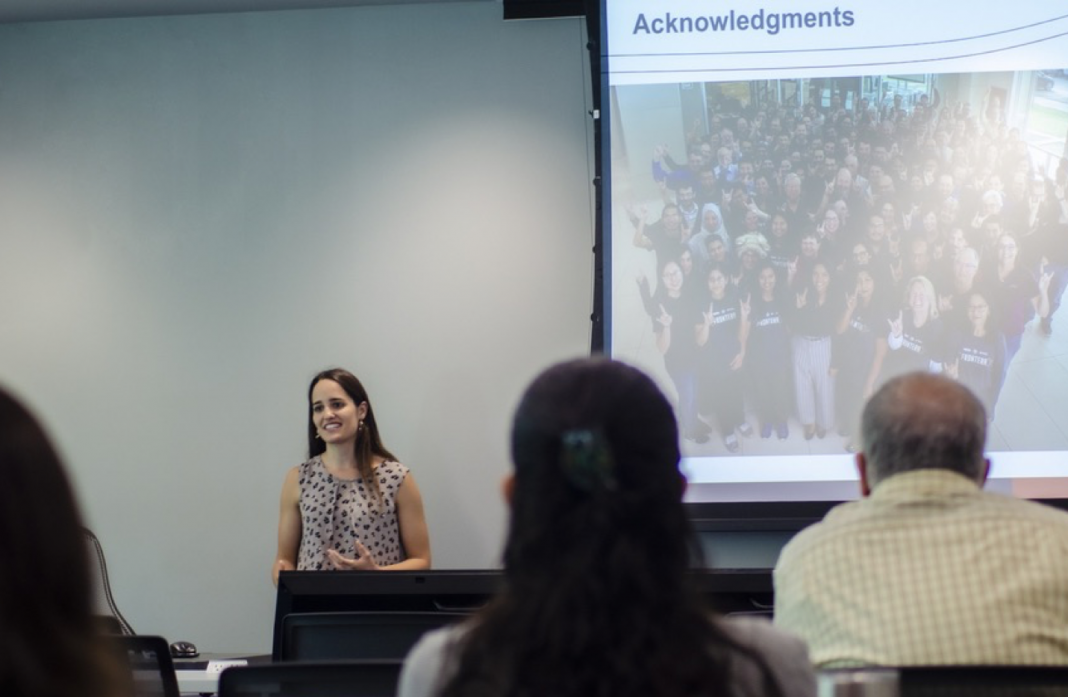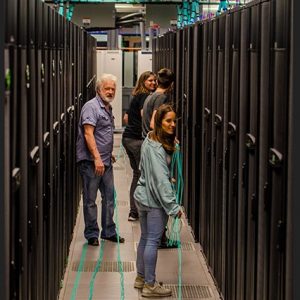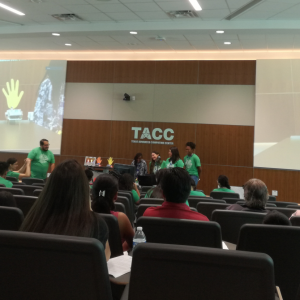Read all about the fascinating experience of this researcher who helped build Frontera, at the Texas Advanced Computing Centre (TACC).
From March to August 2019, Ana Pádua was a visiting scholar at TACC, where she worked with the Life Sciences group. Prior to enrolling in the UT Austin Portugal Program, she received a Master in Biomedical Engineering. She is currently a Ph.D. student in Molecular Biosciences, in the field of biosensors and medical diagnosis at the Universidade NOVA de Lisboa.
Ana applied for the Advanced Computing Training Program in order to have the opportunity to expand her knowledge in the areas of high-performance computing, machine learning, reproducible and scalable computational science, and data visualization. At TACC, she had the unique opportunity to help build Frontera, the fifth most powerful computing system in the world and the fastest supercomputer in any university campus.
Upon her return to Portugal, we talked to Ana about the five months she spent at Austin and how the tools and methodologies she learned and put into practice can influence her work in the future.
– What motivated you to apply for the Advanced Computing Training Program?
I decided to apply for this program because I wanted to improve my knowledge on high-performance computing and machine learning. I believe that these two fields have a key role in contributing to make science more productive, and this will have a huge impact in the future. I was also interested in learning about reproducible and scalable computational science, and data visualization. So, this program at TACC seemed to be the right way to boost my skills in these areas.
– Tell us more about the research work you conducted while at TACC and the research team you worked with.
In the first weeks, I followed tutorials to learn how to use the supercomputers. Then, I attended TACC’s courses and helped to build the new supercomputer (Frontera). I also did volunteer work teaching robotics to high school students. Finally, I worked on my own project, which consisted in the development of an application based on python, containerization and version control. For that, I received valuable feedback and suggestions from the group in which I was integrated (Life Sciences) and from the Visualizationand Cloud and Interactive Computing, as well. It was a pleasure to spend my time working at TACC around so many supportive people.
– In what way was participating in this training program important to your current research? And how do you think it will impact your work moving forward?
My future research will certainly benefit from what I learned at TACC. During this experience, I was exposed to several tools and methodologies which I definitely see myself using in the future because they will allow me to make my research more automatic, and easily reproducible and scalable. For example, the application I developed for my final project is versatile, so I can easily adapt it to future works.
– How would you describe the experience of living and working at Austin?
Living in Austin was one of the best experiences I have ever had. The atmosphere at TACC made me feel comfortable and welcome, and some of my colleagues became my friends. I went there alone, but I never felt lonely. I lived with people from all over the world and we had lots of fun together exploring Austin. It’s the city of the weird, capital of the live music and nature around is astonishing!
– What would you say to future participants of the Advanced Computing Training Program? Any advice(s)?
I would encourage them not to be shy and take this opportunity to communicate with other people as much as they can. Austinites are generally super friendly. I would give future participates three main advices:
1. Take your time to talk to people and learn from them. Interesting talks and good friends can come along the way…
2. Ask for help if you need it. They will be happy to support you!
3. Don’t focus only on your own work but be open to participate in extracurricular activities going on at TACC. This will bring you a lot of fun, and you will learn things beyond your original goals.
– What are your expectations for the future?
In the future, I want to keep working on research. Now that I got new skills on high performance computing and I’ve worked with tools for reproducibility and scalability in computational science, I feel more confident in applying that knowledge. I truly believe this will make me more productive in my future work. Thus, I feel very excited to be able to benefit from everything I learned and apply that for my forthcoming projects! Thank you to UT Austin Portugal and TACC for this opportunity… because as the slogan of the University of Texas says: “What starts here changes the world!”.





